After the highly successful premiere of Rigoletto at La Fenice in March 1851, Verdi was commissioned to deliver an opera for that house, to be performed in March 1853. He and Giuseppina spent some time in Paris during the winter of 1851/52 and there they saw a daring new play by Alexandre Dumas: 'La Dame aux Camélias'. However, Verdi did not decide on this subject right away. He was busy composing Il Trovatore for Rome and did not make up his mind about the new Venetian opera until the end of October 1852.
The triumphant 'Trovatore' premiere on 19th January 1853 out of the way, Verdi was able to concentrate on 'Traviata' and he started on the composition at the beginning of February. Two weeks before the premiere he travelled from Sant'Agata to Venice to do the orchestration while supervising the rehearsals.
The theatre had forced Verdi and Piave (in his capacity as stage director of the premiere) to abandon the contemporary setting and relocate the action back to the year 1700. This rankled Verdi enormously, but he accepted, relieved that the libretto had passed the censor quite quickly and with less trouble than he was used to encounter in Venice.
It would almost seem that the hallmark of some of the most successful and well-loved operas is a less than favourable - even disastrous - reception of the premiere. This was the case also for 'La Traviata' when it was first performed at La Fenice. It was an unmitigated fiasco.
The reasons for this were various, but a large part of the blame was attributed to the singers - the rather ample Salvini-Donatelli did not cut a believable figure as the consumptive courtesan, Graziani was going through a very difficult vocal period at the time, and Varesi was at the end of his career.
In the following months only the opera houses in Genoa and Naples expressed any interest to show the opera, but Verdi declined. He made a number of changes in the score, notably in some sections of the Violetta-Germont duet in Act II/1, Germont's cabaletta at the end of that scene, the duet following the card scene in Act II/2, the concertato of that scene, the duet in Act III, and the finale ultimo. Moreover, if a new production was to be risked, the cast would have to be suitable both in appearance and vocal ability.
This opportunity presented itself exactly 14 months later on 6th May 1854, again in Venice, again with Piave as stage director, but this time at the Teatro San Benedetto, with Maria Spezia, Francesco Landi and Filippo Coletti. It was an overwhelming success.
Opera houses were now clamouring to produce 'La Traviata' and within a few months it was performed in Rome, Naples, Bologna and other Italian cities. The following two years saw productions in Madrid, Vienna, Malta, Barcelona, Lisbon, Rio de Janeiro, London, Paris, Buenos Aires, Warsaw, Moscow, Dublin, New York, and more Italian cities.
After the original La Fenice premiere, Verdi wrote to Emanuele Muzio on 7th March 1853: "'La Traviata' last night was a fiasco. Is it my fault or that of the singers? Only time will tell."
The rest is history. Viva Verdi!
Synopsis
Violetta's House. August in 1850s Paris.
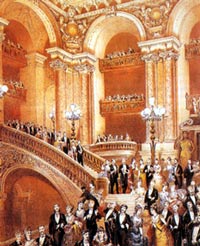 A party is being given at the house of the city's most beautiful and adored courtesan, Violetta Valéry. She greets her guests. Gastone introduces Alfredo Germont to Violetta, and the young man tells Violetta that he admires her and thinks of her constantly. Gastone proposes a toast and Alfredo responds with a drinking song. When the guests move into the ballroom to dance, Violetta feels indisposed and begs her guests to go on without her. Alfredo remains behind and declares how much he loves her. She tells him she can only offer friendship. She gives him a flower, asking him to return when it has faded. Alone, she thinks about Alfredo, but resolves to enjoy herself and her whirlwind lifestyle.
A party is being given at the house of the city's most beautiful and adored courtesan, Violetta Valéry. She greets her guests. Gastone introduces Alfredo Germont to Violetta, and the young man tells Violetta that he admires her and thinks of her constantly. Gastone proposes a toast and Alfredo responds with a drinking song. When the guests move into the ballroom to dance, Violetta feels indisposed and begs her guests to go on without her. Alfredo remains behind and declares how much he loves her. She tells him she can only offer friendship. She gives him a flower, asking him to return when it has faded. Alone, she thinks about Alfredo, but resolves to enjoy herself and her whirlwind lifestyle.
A country house near Paris. The following November.
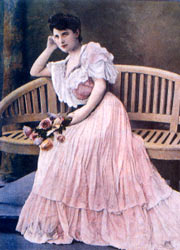 Alfredo and Violetta have been living together in the country for three months, when Alfredo learns from Annina that Violetta has been selling her possessions to support them. Disgraced, he rushes off to Paris to get money. Alfredo's father, Giorgio Germont, surprises Violetta with a visit and requests that she leave Alfredo because his sister may have trouble marrying if her brother is linked to a courtesan. Violetta confesses that Alfredo's love has redeemed her, and that she is very sick and might not live long, but Germont is unmoved and insists on a definite separation. Violetta finally agrees to make the sacrifice and only begs that after she dies, Alfredo should know the reason she left him. She writes a letter and, when Alfredo returns, says good-bye. He assumes she will only be gone for a short while, but a messenger delivers the letter announcing that she has returned to her former lover. Alfredo's father tries to comfort his son, but to no avail.
Alfredo and Violetta have been living together in the country for three months, when Alfredo learns from Annina that Violetta has been selling her possessions to support them. Disgraced, he rushes off to Paris to get money. Alfredo's father, Giorgio Germont, surprises Violetta with a visit and requests that she leave Alfredo because his sister may have trouble marrying if her brother is linked to a courtesan. Violetta confesses that Alfredo's love has redeemed her, and that she is very sick and might not live long, but Germont is unmoved and insists on a definite separation. Violetta finally agrees to make the sacrifice and only begs that after she dies, Alfredo should know the reason she left him. She writes a letter and, when Alfredo returns, says good-bye. He assumes she will only be gone for a short while, but a messenger delivers the letter announcing that she has returned to her former lover. Alfredo's father tries to comfort his son, but to no avail.
A room in Flora's house. Later that day.
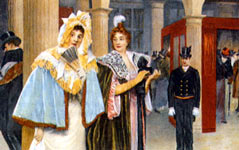 Violetta's friend Flora is hosting a party. Alfredo's arrival startles the guests, but his disinterest in Violetta garners approval. He joins a game of cards as Violetta and her lover, Baron Douphol, enter. The Baron challenges Alfredo and promptly loses. The guests disperse when dinner is announced. Violetta returns to warn Alfredo that his life is in danger and that he should leave the party. He agrees to go only if she follows him. Remembering her oath to his father, Violetta refuses and, furious, Alfredo calls the guests to witness that he has paid her back for their time together. His father arrives and denounces his son for such shameful behaviour, and Douphol vows to avenge Violetta.
Violetta's friend Flora is hosting a party. Alfredo's arrival startles the guests, but his disinterest in Violetta garners approval. He joins a game of cards as Violetta and her lover, Baron Douphol, enter. The Baron challenges Alfredo and promptly loses. The guests disperse when dinner is announced. Violetta returns to warn Alfredo that his life is in danger and that he should leave the party. He agrees to go only if she follows him. Remembering her oath to his father, Violetta refuses and, furious, Alfredo calls the guests to witness that he has paid her back for their time together. His father arrives and denounces his son for such shameful behaviour, and Douphol vows to avenge Violetta.
Violetta's bedroom. February 20.
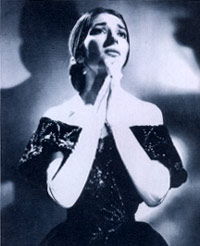 Violetta lies on her deathbed, knowing she will not live much longer. She reads a letter from Alfredo's father, relating how Alfredo fled the country after wounding Douphol in a duel, but promising that he will return to seek her pardon. When Alfredo enters the bedroom, the two reunite joyfully and dream of living in Paris, but Violetta collapses. Alfredo's father arrives and asks foregiveness for the pain he has caused the lovers. Violetta presses a miniature portrait of herself into Alfredo's hands, telling him to give it to the pure bride whom he will marry one day. Violetta suddenly feels that her pains have ceased and that she is coming back to life. But it is too late. . . she dies in Alfredo's arms.
Violetta lies on her deathbed, knowing she will not live much longer. She reads a letter from Alfredo's father, relating how Alfredo fled the country after wounding Douphol in a duel, but promising that he will return to seek her pardon. When Alfredo enters the bedroom, the two reunite joyfully and dream of living in Paris, but Violetta collapses. Alfredo's father arrives and asks foregiveness for the pain he has caused the lovers. Violetta presses a miniature portrait of herself into Alfredo's hands, telling him to give it to the pure bride whom he will marry one day. Violetta suddenly feels that her pains have ceased and that she is coming back to life. But it is too late. . . she dies in Alfredo's arms.
|






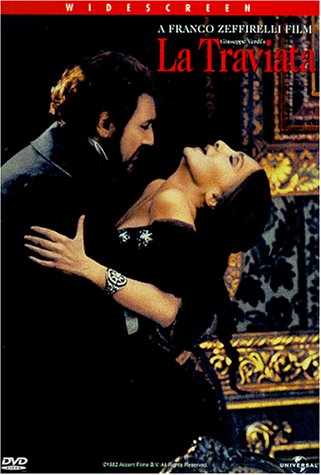

 VIEW LA TRAVIATA HIGHLIGHTS
VIEW LA TRAVIATA HIGHLIGHTS





